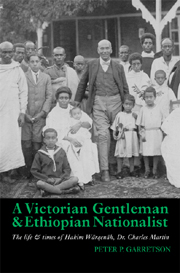 A Victorian Gentleman and Ethiopian Nationalist
A Victorian Gentleman and Ethiopian Nationalist Book contents
- Frontmatter
- Contents
- List of Illustrations
- Transliteration
- Note on the Ethiopian Calendar
- Glossary
- Acknowledgements
- Map 1 Ethiopia 1900–1950
- Map 2 Burma 1898–1919
- Introduction
- 1 Youth & education
- 2 Return to Ethiopia (1896–1901)
- 3 Campaigning in the Ogaden & return to Burma (1901–1907)
- 4 Transitions in life
- 5 A man of substance in Ethiopia & Burma
- 6 Return of a progressive to Addis Ababa (1919–1924)
- 7 An increased pace of modernization (1924–1930)
- 8 International diplomacy, education & recruitment
- 9 Governor of a model province, Chärchär (1930–1935)
- 10 Ethiopian ambassador to the Court of St. James (1935–1936)
- 11 London & India
- 12 Ethiopia
- Conclusion
- Bibliography
- Index
5 - A man of substance in Ethiopia & Burma
Marriage & political influence (1910–1919)
Published online by Cambridge University Press: 05 April 2013
- Frontmatter
- Contents
- List of Illustrations
- Transliteration
- Note on the Ethiopian Calendar
- Glossary
- Acknowledgements
- Map 1 Ethiopia 1900–1950
- Map 2 Burma 1898–1919
- Introduction
- 1 Youth & education
- 2 Return to Ethiopia (1896–1901)
- 3 Campaigning in the Ogaden & return to Burma (1901–1907)
- 4 Transitions in life
- 5 A man of substance in Ethiopia & Burma
- 6 Return of a progressive to Addis Ababa (1919–1924)
- 7 An increased pace of modernization (1924–1930)
- 8 International diplomacy, education & recruitment
- 9 Governor of a model province, Chärchär (1930–1935)
- 10 Ethiopian ambassador to the Court of St. James (1935–1936)
- 11 London & India
- 12 Ethiopia
- Conclusion
- Bibliography
- Index
Summary
Introduction
The fall of Empress Taytu as the defacto leader of Ethiopia in March of 1910 was a major turning point nationally and in Wärqenäh's life and fortunes. Menilek's illness and Wärqenäh's subsequent appointment to a three year government contract and assignment to care for the emperor had given Wärqenäh a degree of access to the highest levels of the Ethiopian elite that he had not previously enjoyed. He was able to interact on a daily and weekly basis with the most powerful people in Ethiopia. Privately, his personal position in Ethiopia had changed subtly but radically. He was no longer in the employ of a foreign government, Britain, but of the Ethiopian government. His social standing had improved parallel to his political influence. In a word, he became one of the most eligible bachelors in the imperial court and he was soon involved in marriage negotiations. Once he began to fall out of favor with the empress his contract with the government was jeopardized as was the source of his financial stability. After she fell from power her successor, the Regent Ras Bitwäddäd Täsämma trusted him and assured him that his contract would be honored. He could also rely on the support of two other major figures, Fitawrari Habtä Giyorgis and Abunä Matéwos. These were three of the most powerful leaders of Ethiopia. Their power increased as did that of his close friend Lej Bäyyänä who was appointed Minister of Posts, Telegraph and Telephone in May of 1910 and his patient and ally Abatä Bayaläw was promoted to Ras a day later.
- Type
- Chapter
- Information
- A Victorian Gentleman and Ethiopian NationalistThe Life and Times of Hakim Wärqenäh, Dr. Charles Martin, pp. 73 - 100Publisher: Boydell & BrewerPrint publication year: 2012


